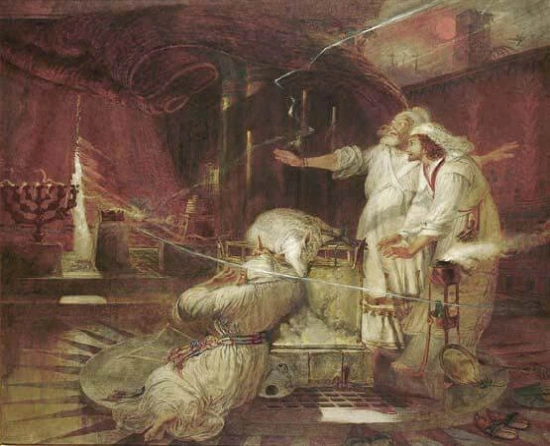484. And God shall wipe away every tear from their eyes, signifies a state of blessedness from the affection of truth, after falsities have been removed by temptations. This is evident from the signification of "wiping away tears from the eyes," as being to take away grief of mind on account of falsities and from falsities; and as blessedness through truths from good follows when that grief ceases after the temptations that have been endured, so this too is signified; for angels have all their blessedness through truths from good, or through the spiritual affection of truth; the spiritual affection of truth is from good, and good constitutes it. This is the source of all blessedness with angels, because Divine truth proceeding from the Lord constitutes heaven in general and in particular, therefore those who are in Divine truths are in the life of heaven, consequently in eternal blessedness.
[2] A "tear from the eyes" signifies grief of mind on account of falsities and from falsities, because the "eye" signifies the understanding of truth; a "tear" therefore signifies grief because there is no understanding of truth, consequently because of falsities. "Tear" has a similar signification in Isaiah:
He will swallow up death forever, and the Lord Jehovih will wipe away tears from off all faces (Isaiah 25:8).
This signifies that the Lord by His coming will remove evils and falsities with those who live from Him, so that there will be no grief of mind on account of them and from them; "death" signifies evil, because spiritual death is from it; and "tear" is predicated of falsity.
[3] It is to be noted, that both "shedding tears" and "weeping" signify grief on account of falsities and from falsities, but "shedding tears" grief of mind, and "weeping" grief of heart on account of falsities. Grief of mind is grief of the thought and understanding, which pertain to truth, and grief of heart is grief of the affection or will, which pertain to good; and as there is everywhere in the Word a marriage of truth and good, both "weeping" and "tears" are mentioned in the Word when grief is expressed on account of falsities of doctrine or of religion. That "weeping" means grief of heart can be seen from the fact that "weeping" bursts forth from the heart and breaks out into lamentations through the mouth; and that "shedding tears" is grief of mind can be seen from this, that it issues forth from the thought through the eyes. In both weeping and in the shedding of tears water comes forth which is bitter and astringent, and this occurs through an influx into man's grief from the spiritual world, where bitter water corresponds to the lack of truth because of falsities, and to consequent grief; therefore those who are in truths grieve on account of falsities. From this it can be seen why it is that in the Word, where "tears" are mentioned "weeping" also is mentioned, namely, that it is on account of the marriage of good and truth in every particular of the Word.
[4] I will only adduce the following passages in evidence of this. In Isaiah:
I will weep with weeping for Jazer, the vine of Sibmah; I will water thee with my tears, O Heshbon and Elealeh (Isaiah 16:9).
In Jeremiah:
In secret places my soul shall weep, and mine eyes shall run down with tears (Jeremiah 13:17).
In the same:
Who will give mine eyes a fountain of tears, that I may weep day and night (Jeremiah 9:1).
In Lamentations:
In weeping she will weep in the night, and her tears are on her cheeks (Lamentations 1:2).
In Malachi:
Covering the altar of Jehovah with tears, with weeping, and with sighing (Malachi 2:13).
In David:
They that sow with tears and he that weeping beareth the casting of seed (Psalms 126:5, 6).
In Jeremiah:
Refrain thy voice from weeping, and thine eyes from tears (Jeremiah 31:16).
In the same:
Let the mourning-women make haste and take up a lamentation over us, that our eyes may flow down with tears (Jeremiah 9:18).
Here we have "lamentation" in place of weeping, because it is the voice of weeping. In David:
I am weary with my sighing, all the night do I bathe my bed; with my tears I make my couch to melt (Psalms 6:6).
Here "to bathe the bed" means by weeping, which is of the mouth, because it is said of sighing; while "to drench the couch," which has a like meaning, has reference to tears. These passages have been cited that from them also it may be known that two like expressions in the Word, especially in the Prophets, are not vain repetitions, but that one has reference to good, and the other to truth.








